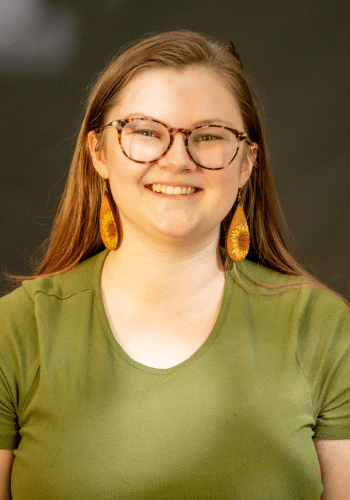Savannah Collins JD/MCEP’25 decided to attend Vermont Law and Graduate School (VLGS) because she was looking for more than an environmental law school. She was searching for a school with a rigorous environmental justice program, and she found VLGS’s Environmental Justice Clinic (EJC). The clinic fit her criteria perfectly. The move from North Carolina was daunting for Savannah, but the EJC was unique.
“I was excited about it,” Savannah said. “Mia Montoya Hammersley, the director of the Environmental Justice Clinic, came in and rocked my world. She has taught me so much about being a compassionate lawyer and an advocate in ways that the profession does not teach in general.”
Montoya Hammersley has taught Savannah that lawyers are just people with a specific set of skills. This outlook makes her feel much more engaged with clients. She believes it has made her a better law student, as she views the skills she is learning as valuable tools to help other people, and that it’s her responsibility to be a resource for people.
Savannah explained that many clinics focus on litigation, which doesn’t fully teach students the many different ways a lawyer can advocate. The EJC is special because it teaches community lawyering. Savannah can share what she is learning with clients. For example, she can share with them what to expect from the National Environmental Policy Act (NEPA) and its processes, so that they’re better equipped to help themselves later.

Savannah is looking forward to working as an advanced clinician in the clinic this semester. “We don’t just learn through theory,” she said. “We have the opportunity to gain professional field experience. I’m looking forward to being able to flex my muscles on different topics and help the incoming students learn more about being attorneys.”
Savannah also used her research skills and experience from the clinic during her Master of Climate and Environmental Policy externship at Eubanks & Associates, PLLC. She worked on projects focused on agency enforcement of rules under the Endangered Species Act and the National Environmental Policy Act.
“This is my favorite part about becoming a lawyer,” Savannah said. “Making sure that the rules that people set up are followed properly. I was able to work in different circuits and see how these circuits are applying these laws. The way we argued a case in front of the 9th Circuit would be different than the way we argued it in front of the 10th Circuit. This was an invaluable experience and perspective beyond regular coursework.”
As Savannah looks to the future, she is determined to be an advocate for change. She knows that environmental justice is needed everywhere but, as a native of North Carolina, she understands the needs of the South. She wants to work with those organizations that are doing the work on the ground. “It’s my responsibility as someone with the skill set to go down and serve the communities that are close to my heart,” Savannah said.
This is one reason Savannah wrote a note that will be published this year by the Vermont Journal of Environmental Law titled “Come Home or High Water: How National Flood Insurance Requirements Are Creating Redlining 2.0.” She wanted to address equity issues such as redlining. “It’s society’s responsibility as we try to shape a fairer and more just world, to step in and say, okay, we’ve made some mistakes,” she explained. “Let’s learn from these mistakes and now make sure everyone has a healthy and happy path.”
Savannah admits that it might be an optimistic approach, but she believes there’s a good chance we can fix these issues. She thinks the transitions needed to combat climate change provide an excellent opportunity to reset the equity scale and repair the issues we are dealing with now.
In a world grappling with environmental crises and an ever-changing legal landscape, Vermont Law and Graduate School has cultivated leaders who are ready to tackle the most pressing challenges. The Environmental Justice Clinic and master’s externship experiences have prepared Savannah and made her determined to advocate for and defend clients. She sums it up by saying, “I want people to have a better life next year because I helped them with something today.”